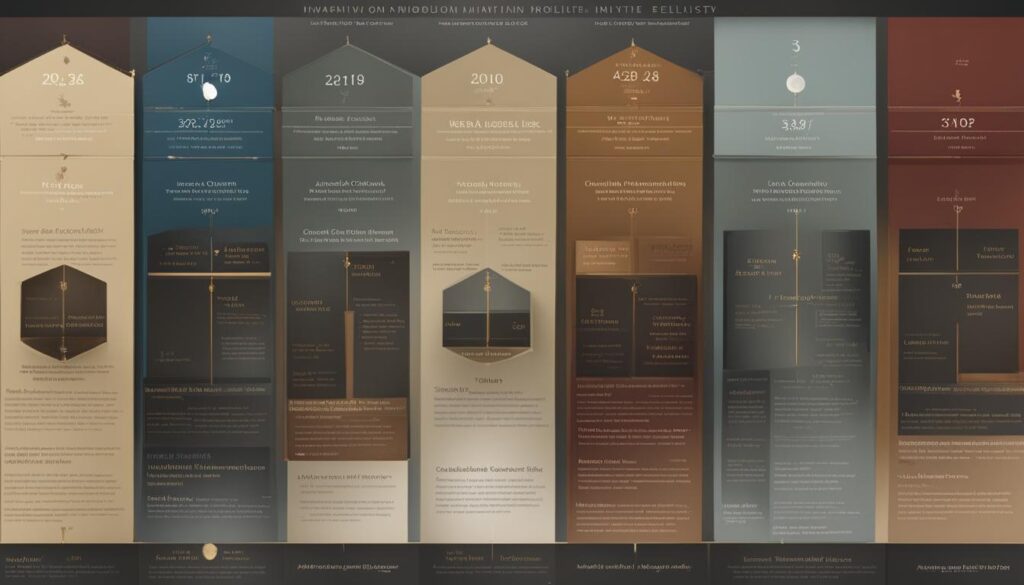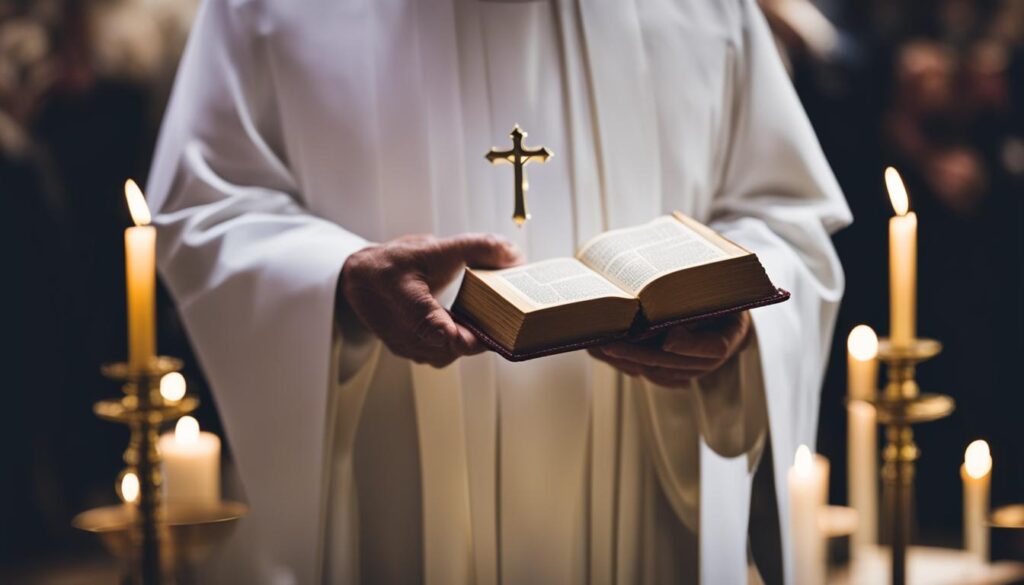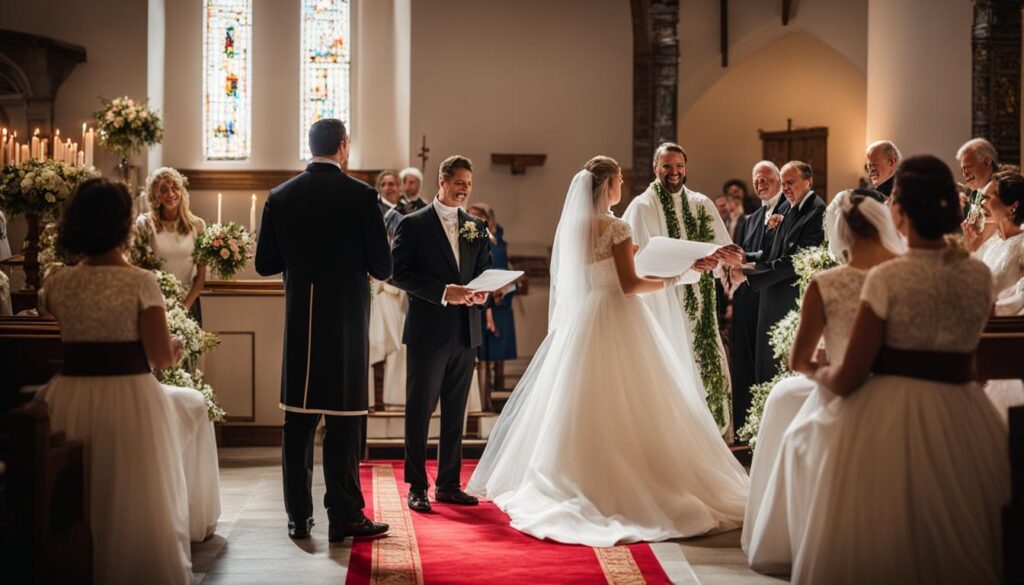Welcome to our article series on the topic of marriage and the Protestant clergy. In this first section, we will explore the question: Can Protestant priests marry? It’s a topic that has sparked much debate and curiosity among believers and non-believers alike. So, let’s dive in and uncover the truth behind this intriguing question.
Before we begin, let’s clarify that the answer to whether Protestant priests can marry is not a simple yes or no. It varies depending on the specific denomination and tradition within Protestantism. Throughout history, different branches of Christianity have approached the issue of marriage and clergy in their own unique ways.
Key Takeaways
- Marriage among Protestant priests is not universally prohibited or mandatory.
- Eastern churches allow married men to become priests, while unmarried priests cannot marry.
- Western or Latin-Rite Church priests and bishops traditionally take vows of celibacy, but exceptions can be made for married priests who converted from other denominations.
- Interpretations of biblical passages regarding celibacy and marriage differ among Protestant denominations.
- Celibacy in the Catholic Church is a mandatory discipline for clergy in the Latin Church, except for permanent deacons.
Now that we have set the stage, let’s move on to the next section, where we will explore the biblical basis for celibacy and its relevance to the Protestant clergy.
The Biblical Basis for Celibacy
When it comes to the topic of celibacy and Protestant priests, there is often a misconception that celibacy is unbiblical. However, a closer look at the teachings of Jesus and Paul reveals a strong biblical basis for celibacy. In fact, both Jesus and Paul advocate for celibacy as a way to dedicate oneself completely to the Lord.
One of the key passages that supports the idea of celibacy is found in 1 Corinthians 7, where Paul discusses the value of both marriage and celibacy. He acknowledges that marriage is a legitimate and honorable path for those who are unable to maintain their sexual desires, but he also emphasizes that celibacy is a higher calling. Paul states that those who are able to remain single can better focus on serving the Lord without the distractions that come with marriage.
It is important to note that the biblical support for celibacy does not mean that it is a requirement for all clergy. In Protestantism, there is no universal mandate for celibacy among priests or ministers. The decision to marry or remain celibate is left to the individual’s personal discernment and the guidelines of their specific denomination or tradition.
The Biblical Basis for Celibacy:
- Jesus and Paul both advocate for celibacy as a way to dedicate oneself completely to the Lord.
- 1 Corinthians 7 emphasizes the value of celibacy for those who are able to remain single.
- Protestantism does not universally require celibacy for clergy.
In conclusion, while celibacy may not be mandatory for Protestant priests, there is indeed a biblical basis for embracing the celibate life. It is a personal choice that some clergy make in order to fully devote themselves to their religious service. At the same time, it is important to respect the diversity of beliefs and practices within Protestantism when it comes to matters of marriage and celibacy.
Is Marriage Mandatory for Church Leaders?
When discussing the topic of marriage and church leaders, one question that often arises is whether marriage is mandatory for Protestant priests. Many people assume that clergy members in Protestant denominations are required to be married, but this is not necessarily the case.
While some Protestant denominations do have specific guidelines for ministry and marriage, such as the Anglican Church, where clergy are allowed to marry, others do not have such requirements. The decision to marry or remain single is often left up to the individual and their personal calling to ministry.
It is important to note that the biblical basis for a requirement of marriage for church leaders is often misinterpreted. The passage from 1 Timothy 3:2 where it mentions that a bishop should be the “husband of one wife” is not a mandate for all clergy members to be married. Instead, it is emphasizing the importance of having a stable family life and being committed to one spouse.
Marital Status and Ministry
Ultimately, the issue of marriage and church leadership comes down to individual denominational practices and beliefs. Some Protestant denominations may encourage or even require clergy members to be married, while others leave it as a personal choice. The important factor is the individual’s commitment to their faith and their ability to effectively lead and serve their congregation.
- Can priests get married?
- Protestant ministry and marriage
- Protestant priests and marital status
By understanding the nuances of different denominational practices and interpretations of Scripture, we can have a more accurate understanding of the role of marriage in church leadership. The decision to marry or remain single should not be seen as a requirement for all clergy members but rather as a personal choice that can vary among different Protestant denominations and individual clergy members themselves.
The Discipline of Celibacy in the Catholic Church
In the Catholic Church, celibacy is a sacred and mandatory discipline that is upheld by all clergy in the Latin Church, excluding permanent deacons. This centuries-old practice is deeply rooted in the Church’s tradition and is seen as a way for priests to devote themselves entirely to the service of God and His people.
The commitment to clerical celibacy means that priests willingly choose to abstain from marriage and sexual relationships. By forgoing these earthly desires, they are able to focus their energy and attention solely on their spiritual duties. This selfless act of sacrifice is seen as a way to emulate Christ, who Himself lived a life of celibacy and devoted Himself completely to His mission.
It is important to note that while celibacy is mandatory for priests in the Latin Church, there are some exceptions. In certain cases, married clergy from other Christian denominations may be permitted to become Catholic priests. However, this is not a widespread practice and is subject to the discretion of the Church hierarchy.
The History and Purpose of Celibacy

Celibacy has a long history in the practice of religious leadership, particularly in the Catholic Church. Its origins can be traced back to the Middle Ages when celibacy became a requirement for clergy. This requirement was primarily instituted to address issues related to church property and dynasties, ensuring that clerics’ children wouldn’t inherit church assets and create hereditary lines of power.
By embracing celibacy, religious leaders could fully devote themselves to their spiritual duties, unencumbered by familial responsibilities. This sacrifice was seen as a way to demonstrate their commitment to God and prioritize their religious obligations above all else. It allowed them to focus entirely on their religious duties and serve as spiritual guides for their communities.
The Purpose of Celibacy
- Devotion to God: Celibacy is viewed as a way for clergy to dedicate their lives entirely to serving God and their religious communities.
- Focus on Spiritual Duties: By abstaining from marital and familial responsibilities, celibate clergy can focus their energy and time on fulfilling their religious obligations.
- Symbol of Sacrifice: Celibacy is seen as a sacrifice voluntarily undertaken by clergy to show their willingness to prioritize their faith above personal desires.
- Elevation of Spiritual Authority: The practice of celibacy has historically been associated with the idea that those who abstain from physical relationships have a higher level of spiritual purity and authority.
Clerical Celibacy in the Middle Ages
During the Middle Ages, the Catholic Church established strict rules regarding celibacy for its clergy. These rules were seen as a means to maintain control over clerical assets, prevent the formation of powerful clerical families, and reinforce the spiritual authority of the Church. While the requirement of celibacy is not a dogma but an ecclesiastical law, it continues to be upheld in the Catholic Church today.
In contrast, Protestant denominations have varying views on celibacy, with some allowing clergy to marry and others maintaining a tradition of celibacy. Anglicanism and Lutheranism, for example, permit clergy to marry, while celibacy is still practiced by select individuals within these traditions, such as monks and nuns. Ultimately, the decision to marry or remain celibate is a personal and religious choice for Protestant clergy.
Celibacy in Other Christian Traditions

Celibacy is not a mandatory requirement for clergy in Protestantism. Unlike in the Catholic Church, where celibacy is a discipline for all clergy in the Latin Church, Protestant denominations have different practices regarding the marital status of their clergy. Let’s explore the approach of some key Christian traditions towards celibacy.
Celibacy in Anglicanism
In Anglicanism, clerical celibacy is not compulsory. Anglican priests are allowed to marry, and many clergy members are in fact married. The Church of England, in particular, changed its stance on celibacy during the Reformation. Today, Anglican priests have the freedom to choose whether they want to marry or remain celibate.
Married Priests in Lutheranism
Similarly, Lutheranism also permits the marriage of clergy. Martin Luther, the founder of the Lutheran tradition, believed that priests should have the freedom to marry and have families. Luther himself married a former nun. Consequently, many Lutheran clergy members are married, and their marital status does not hinder their eligibility to serve in the ministry.
It is important to note that while celibacy may not be required in these traditions, there are still individuals who choose to remain celibate within certain orders or traditions within Protestantism, such as monastic communities or religious orders. These individuals make a personal commitment to dedicate their lives fully to God’s service.
Overall, the approach to celibacy varies across different Christian traditions. While celibacy is not mandatory for Protestant priests, traditions like Anglicanism and Lutheranism allow and even encourage the marriage of clergy. The decision to marry or remain celibate ultimately depends on the individual’s personal beliefs and the practices of their specific denomination or tradition.
Conclusion
After exploring the topic of celibacy in Protestantism and Catholicism, it is clear that there are significant differences between the two traditions.
In Protestantism, celibacy is not mandatory for priests, allowing them the option to marry if they so choose. This freedom reflects the emphasis on individual interpretation and personal choice within Protestant theology.
On the other hand, in Catholicism, celibacy is a mandatory discipline for priests in the Latin Church, although exceptions can be made for married clergy who convert to Catholicism.
Ultimately, the decision to marry or remain celibate is deeply rooted in personal and religious beliefs for Protestant clergy. While celibacy is seen as a way to dedicate oneself wholly to religious service in Catholicism, it is not a requirement for Protestant priests.
FAQ
Can Protestant priests marry?
Yes, Protestant priests have the option to marry. While celibacy is not required for Protestant clergy in general, some choose to marry while others choose to remain celibate.
What is the biblical basis for celibacy?
Both Jesus and Paul advocate for celibacy for those who are capable of it. In 1 Corinthians 7, Paul promotes celibacy as a way to dedicate oneself completely to the Lord.
Is marriage mandatory for church leaders?
No, marriage is not mandatory for church leaders. The requirement for bishops to be the “husband of one wife” does not mean that they must be married, but rather that they must have only one wife and a stable family life.
What is the discipline of celibacy in the Catholic Church?
In the Catholic Church, celibacy is a mandatory discipline for all clergy in the Latin Church, except for permanent deacons. Eastern Catholic Churches may have different rules, allowing the ordination of married men as priests but requiring celibacy for bishops.
What is the history and purpose of celibacy?
The requirement of clerical celibacy is not a dogma but an ecclesiastical law that was adopted in the Middle Ages. It was instituted to prevent clerics’ children from inheriting church property and creating dynasties. Celibacy is seen as a sacrifice that allows clergy to focus entirely on their religious duties.
Is celibacy practiced in other Christian traditions?
While celibacy is not mandatory for Protestant priests, it is a discipline that some choose to follow. Anglicanism and Lutheranism, for example, allow and even encourage clerical marriage. However, celibacy is still practiced by some Protestant clergy, such as monks and nuns, as well as in certain orders and traditions within Protestantism.
What is the conclusion regarding celibacy?
The decision to marry or remain celibate is ultimately a personal and religious choice for Protestant clergy. In Catholicism, celibacy is mandatory for priests in the Latin Church, but exceptions can be made for some married clergy who convert.

